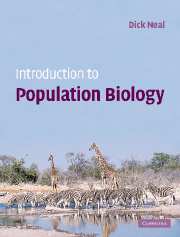Book contents
- Frontmatter
- Contents
- Preface
- Acknowledgements
- PART I Evolution by natural selection
- PART II Simple population growth models and their simulation
- PART III Population genetics and evolution
- PART IV Demography
- PART V Interactions between species, and the behaviour of individuals
- Chapter 17 Interspecific competition and amensalism
- Chapter 18 Predation
- Chapter 19 Animal behaviour, natural selection and altruistic traits
- Chapter 20 Sexual selection and mating systems
- Chapter 21 Epilogue
- Glossary
- Solutions to problems
- References
- Index
Chapter 19 - Animal behaviour, natural selection and altruistic traits
- Frontmatter
- Contents
- Preface
- Acknowledgements
- PART I Evolution by natural selection
- PART II Simple population growth models and their simulation
- PART III Population genetics and evolution
- PART IV Demography
- PART V Interactions between species, and the behaviour of individuals
- Chapter 17 Interspecific competition and amensalism
- Chapter 18 Predation
- Chapter 19 Animal behaviour, natural selection and altruistic traits
- Chapter 20 Sexual selection and mating systems
- Chapter 21 Epilogue
- Glossary
- Solutions to problems
- References
- Index
Summary
In chapter six of The Origin of Species, Darwin showed that behavioural traits are evolutionary adaptations that have evolved by means of natural selection in just the same way as morphological and physiological traits. For this to be true, two conditions are necessary. First, variation in behaviour must be related to differences in survival or reproductive success, and second there must be a genetic basis to this variation in behaviour, at least in part.
It is not difficult to see that variation in behaviour can influence survival and reproductive success. For example, the success of lions in catching and eating animals like wildebeest (Connochaetes spp.) or zebra (Equus spp.) depends partly on their ability to stalk and get sufficiently close to the herd so that they are able to catch and bring down an animal when they make their final attack. If their hunting technique is good, they may be successful, but if they have a poor hunting technique they will probably see their intended prey escape before they can reach them and will go hungry as a consequence. On the other hand, the flight response of wildebeest and zebra depends on their ability to detect the lions before they attack, and this requires constant vigilance as we saw in Chapter 18. The least vigilant individuals, and those that are slow to respond when predators are detected, are the ones that are most likely to be killed in an attack.
- Type
- Chapter
- Information
- Introduction to Population Biology , pp. 318 - 335Publisher: Cambridge University PressPrint publication year: 2003



